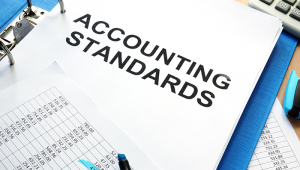Web_BoardMeeting_shutterstock_217359640.jpg

Businessmen
In drama, accountants (if there are any) are usually characterised as dull and almost invisible. However, it was not the G-men that brought down Al Capone, but an accountant.
Looking at the economic history of the western world, accounting was one of the main prerequisites for political and economic success and accountants are often behind the rise and fall of both large corporations and nations.
It is with accounting as with health. When all is well it’s unnoticed and unappreciated.
But when it fails, it is impossible to disregard. The pension deficit from the collapsed BHS threatened the incomes of thousands of former workers in the UK. In the US, Enron, AIG and Lehman Brothers shook Wall Street and Main Street to its core.
Such corporate accounting scandals have questioned the purpose of capitalism and whether the public company’s only social responsibility was to increase its profits.
Corporations and investors today recognise that profit alone is not enough in order to maintain their social license.
This is partly evidenced through the development of Integrated Reporting and ESG Reporting (Environmental, Social and Governance), as well as the rise of ethical investing.
More importantly perhaps, each failure triggered an endless game of catch-up from legislators, regulators and the accounting profession.
The public sector is however, if possible, even less trusted than the private sector.
The failures of governments are legion and often with more devastating consequences (witness Greece, for example).
On top of that we have a growing global frustration with governments seen as having done too little for too many voters.
On several issues ranging from retirement to infrastructure governments are failing to prepare for the future, according to Larry Fink, the CEO of BlackRock - a large asset manager.
One way to change this trend of diminishing resources and the trust in how those resources are spent, would be to correct the failure of many governments to use modern accounting.
Proper accounting is necessary for politicians to act in the long-term interests of their communities.
Without the use of modern accounting and professional governance, we cannot properly manage our assets finances, and in particular are leaving the largest wealth segment in the world - public assets - mismanaged, resources wasted, obligations hidden and ultimately open to corruption.
The public sector owns airports, ports, utilities, and sometimes even banks and listed corporations. But most of all it owns large portfolios of real estate.
Excluding public parks and historical heritage sites, these properties take up about a quarter of the land within most cities’ limits, and often at the national level a significant proportion of a country’s land.
However, only a fraction of these properties is known to the government, or even visible on the government accounts.
According to estimates from the International Monetary Fund, public assets are worth at least twice an economy’s gross domestic product. Still, most governments largely ignore these assets, and the value that could be generated from them, when developing their budgets.
In fact, professional management of public assets could, across advanced economies, generate annually more revenues than governments receive in corporate tax collections and multiply the funds available for infrastructure investments.
‘Since modern accounting was invented 800 years ago, corporates have had to develop high quality information for decision-making held comprehensively accountable to a range of stakeholders.’
Since modern accounting was invented 800 years ago, corporates have had to develop high quality information for decision-making held comprehensively accountable to a range of stakeholders.
This has helped generate the prosperity we enjoy today. But the same progress has not been made by governments. Public assets, the largest wealth segment in the world remains largely, unknown, unregulated and unaudited.
Adopting accounting standards similar to those used by private companies and based on accrual accounting — as recommended by the International Public Sector Accounting Standards Board—would be an important first step to restore trust in government and faith in democracy. Not to mention an additional revenue stream for governments without raising taxes.
Implementing modern public financial-management systems isn’t rocket science. Yet, even among the governments of developed economies, progress is slow.
And while most OECD countries are now reporting on an accrual basis and showing a balance sheet, the majority are still budgeting and appropriating in a Medieval fashion - on a cash basis. This means the balance sheet sits outside the budget process and for that reason is largely ignored.
The absence of a proper balance sheet, fully integrated into the budget, distorts the incentive for politicians. Governments today still focus mainly on debt, without recognising the value of the physical assets, using measures such as ‘net debt’ or ‘debt/GDP’ as key targets. This has led to wasteful short-term decisions, such as when privatising water utilities because of the need for large scale investments. Something that would have otherwise negatively impacted the misguided debt measures.
With proper accounting, governments could focus on net worth – the measure used in the private sector, instead of a focus on debt alone. With net worth as the official key target, an increase in debt to finance an investment is matched with an increase in assets. This would then incentivise investments in government owned assets rather than encouraging wholesale privatisation which may be for the wrong reasons and at the wrong price.
A focus on debt alone has also led to governments embracing much-criticised financial techniques such as the Private Finance Initiative (PFI) or Public Private Partnerships (PPP), where the main advantage was keeping debt off the government’s balance sheet. However, it has often led to an undue transfer of public wealth to the private sector partners.
The absence of high-quality financial information systems in governments is pervasive and serious. Addressing this would be a first step to restoring trust in government and faith in democracy – to the benefit of society as a whole.
Like Clark Kent, it is time for accountants to shed their dreary suits and glasses - act like real super heroes and bring on proper transparency to governments.













